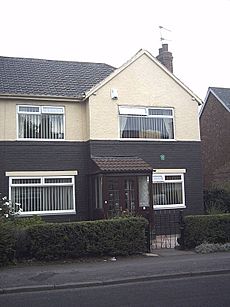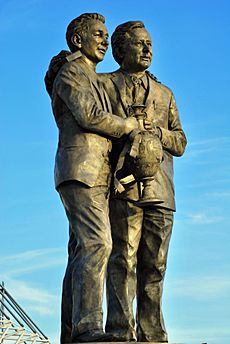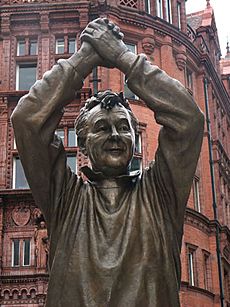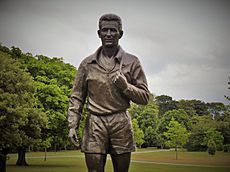Brian Clough facts for kids
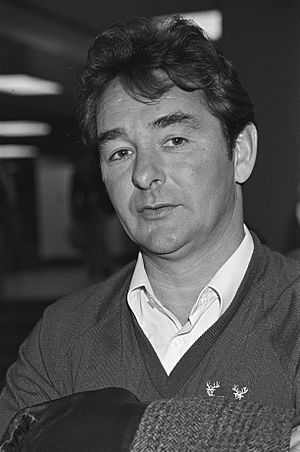
Clough as Nottingham Forest manager in 1980
|
|||
| Personal information | |||
|---|---|---|---|
| Full name | Brian Howard Clough | ||
| Date of birth | 21 March 1935 | ||
| Place of birth | Middlesbrough, England | ||
| Date of death | 20 September 2004 (aged 69) | ||
| Place of death | Derby, England | ||
| Height | 5 ft 10 in (1.78 m) | ||
| Position(s) | Striker | ||
| Youth career | |||
| 1951–1953 | Middlesbrough | ||
| 1953–1955 | Billingham Synthonia | ||
| Senior career* | |||
| Years | Team | Apps | (Gls) |
| 1955–1961 | Middlesbrough | 213 | (197) |
| 1961–1964 | Sunderland | 61 | (54) |
| Total | 274 | (251) | |
| International career | |||
| 1957–1958 | England U23 | 3 | (1) |
| 1957 | England B | 1 | (1) |
| 1959 | England | 2 | (0) |
| Managerial career | |||
| 1965–1967 | Hartlepools United | ||
| 1967–1973 | Derby County | ||
| 1973–1974 | Brighton & Hove Albion | ||
| 1974 | Leeds United | ||
| 1975–1993 | Nottingham Forest | ||
| *Club domestic league appearances and goals | |||
Brian Howard Clough OBE (/klʌf/ kluf; 21 March 1935 – 20 September 2004) was a famous English football player and manager. He is best known for his amazing success as a manager with Derby County and Nottingham Forest. He is one of only four managers to win the English league title with two different clubs.
Clough played as a striker for Middlesbrough and Sunderland. He scored an incredible 251 goals in 274 league matches. This makes him one of the Football League's highest goalscorers ever. He also played twice for the England national team. His playing career ended early at age 29 due to a serious injury.
After his playing days, Clough became a manager. He often worked closely with his assistant, Peter Taylor. Clough was also known for his strong opinions. He often gave interviews where he spoke his mind about players, other managers, and the game itself.
In 1965, he took over as manager at Hartlepools United. He brought Peter Taylor with him, starting a long and successful partnership. In 1967, they moved to Derby County. They led Derby to become champions of the Second Division in 1969. Three years later, in 1972, Derby won the English league title for the first time. In 1973, they reached the semi-finals of the European Cup. However, Clough and the club chairman had disagreements, so he and Taylor resigned.
Clough then had a short time at Brighton & Hove Albion. In 1974, he became manager of Leeds United, but without Taylor. This was a big surprise because Clough had often criticized Leeds and their previous manager. He was sacked after only 44 days. Soon after, he joined Nottingham Forest in the Second Division. Peter Taylor joined him there in 1976.
In 1977, Forest were promoted to the top league. The very next season, they won the league title! This made Clough one of the few managers to win the English league with two different clubs. Forest also won the European Cup twice in a row (in 1979 and 1980). They also won two League Cups (1978 and 1979). Peter Taylor retired in 1982. Clough stayed at Forest for another ten years, winning two more League Cups (1989 and 1990). He also reached the FA Cup final in 1991. Forest were relegated from the Premier League in 1993, and Clough retired from football.
Brian Clough was a very strong and interesting character. He is seen as one of the greatest managers in English football history. His achievements with Derby and Forest, who weren't usually top teams, are considered amazing. His teams were also known for playing exciting football and for being fair. Even though many people wanted him to be the England manager, he never got the job. He is often called the "greatest manager England never had."
Contents
Childhood and Early Life
Brian Clough was born on 21 March 1935, in Grove Hill, Middlesbrough, England. He was the sixth of nine children. His father worked in a sweet shop and later in a sugar factory. Brian loved his childhood and felt very grateful for his parents. He said his upbringing in Middlesbrough, even though it wasn't the fanciest place, felt like "heaven" to him. He admired his mother, who worked tirelessly to care for eight children.
In 1946, Brian didn't pass his Eleven-plus exam and went to Marton Grove Secondary Modern School. He later admitted that he focused more on sports than on his schoolwork. However, he still became Head Boy at school. He also said that cricket was his first love as a child, even more than football. He left school in 1950 without any qualifications to work at a chemical company. He then did his national service in the RAF Regiment from 1953 to 1955.
Playing Career
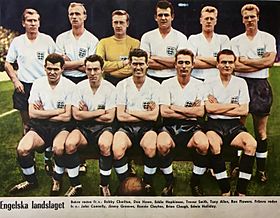
Before his national service, Clough played for Billingham Synthonia. After that, he became a fantastic striker for his hometown club, Middlesbrough. He scored 204 goals in 222 league games for Middlesbrough. This included scoring 40 or more goals in four seasons in a row!
However, Clough often asked to be transferred and sometimes had disagreements with his teammates. He was frustrated by Middlesbrough's weak defence, which let in many goals. After one match that ended 6–6, he jokingly asked his teammates how many goals they needed to score to win. While at Middlesbrough, Clough met goalkeeper Peter Taylor. They would later become a very successful management team. Clough played twice for the England national football team, but he didn't score.
In July 1961, Clough moved to Sunderland for £55,000. He continued to score many goals, with 63 goals in 74 matches for Sunderland. In the 1962–63 season, he had already scored 24 league goals by December. But on 26 December 1962, during a match against Bury, Clough suffered a very serious knee injury. In those days, such an injury usually ended a player's career. He tried to come back two years later but only played three more games before retiring at age 29.
Clough's manager at Sunderland, Alan Brown, was a very strict person. Brown was a big influence on Clough. He demanded discipline and fined players for small mistakes. Clough later adopted many of these traits when he became a manager himself. Brian Clough has one of the highest goals-per-game ratios in English league history, scoring 0.916 goals per game.
Management Career
Hartlepools United
After coaching the Sunderland youth team for a short time, Clough became manager of Hartlepools United in October 1965. He was only 30 years old, making him the youngest manager in the league. He immediately asked Peter Taylor to join him as his assistant. Hartlepools was a struggling team, often finishing at the bottom of the Fourth Division. The club was in such bad financial shape that Clough even helped raise money in local pubs.
In November 1966, the chairman tried to sack Peter Taylor, saying he couldn't afford him. Clough refused to accept this, so the chairman sacked Clough too. However, other board members stepped in and removed the chairman instead. Both Clough and Taylor were brought back. Hartlepools slowly got better, finishing eighth in 1966–67. Two players from this team, Les Green and John McGovern, would later play for Clough and Taylor at other clubs. In May 1967, Clough and Taylor moved to Derby County. The next season, Hartlepools was promoted for the first time ever.
Derby County
Derby County had been in the Second Division for ten years before Clough arrived. Their only major trophy was the FA Cup in 1946. In Clough's first season, Derby finished one place lower, but he began building a strong team. He signed several new players like Roy McFarland, John O'Hare, John McGovern, and Alan Hinton. He also kept some key players from the old squad. Clough was known for being tough but fair. He wanted his players to play cleanly and expected respect.
With new signings like Dave Mackay in 1968, Clough and Taylor led Derby to become champions of the Second Division. They set a club record of 22 matches without a defeat. In their first season back in the First Division, Derby finished fourth, their best result in over twenty years.
In the 1971–72 season, Derby competed with Liverpool, Leeds United, and Manchester City for the title. Derby won their last match 1–0 against Liverpool and ended up at the top of the league table by one point. Both Liverpool and Leeds United had a chance to overtake Derby in their final games, but they failed. This meant Derby were league champions for the first time in their 88-year history! Peter Taylor took the players on holiday, while Clough heard the news while on holiday with his family.
Challenges at Derby County
In August 1972, Clough refused to go on a pre-season tour unless his family could come. The chairman said it was a work trip, so Clough sent Taylor in his place. Later, Clough and Taylor signed David Nish for a record transfer fee without telling the Derby board. Clough also publicly criticized Derby County fans for not cheering enough. He also spoke out against the club's board of directors. The chairman, Sam Longson, apologized to the fans and disagreed with Clough's comments.
That season, Derby finished seventh but reached the semi-finals of the European Cup in April 1973. They lost to Juventus. Clough felt the referee was unfair and might have been influenced to favor the Italian team. Clough often made strong comments against football authorities and other managers. These comments, along with his growing fame, led to more disagreements with the chairman, Sam Longson.
In August 1973, Clough wrote an article criticizing Leeds United's discipline. He suggested Leeds should be fined and even moved down to the Second Division. He was later accused of bringing the game into disrepute, but he was cleared. Clough also tried to buy Bobby Moore and Trevor Brooking from West Ham without telling the Derby board. The chairman found out later, which added to their problems.
Leaving Derby County
Clough and Taylor had briefly resigned in 1972 to manage Coventry City but changed their minds when Derby offered them more money. However, on 11 October 1973, the chairman, Sam Longson, tried to sack both Clough and Taylor. He also demanded that Clough stop writing newspaper articles and appearing on TV. Clough and Taylor hoped to remove Longson as chairman, but they failed. Both Clough and Taylor resigned on 15 October 1973. This caused a big outcry from Derby fans, who wanted them back. That evening, Clough appeared on TV and criticized football directors for not knowing enough about the game.
The six years at Derby County made Brian Clough famous in the football world. He was seen as a young, energetic manager who had achieved great things.
Brighton & Hove Albion
After leaving Derby, Clough and Taylor, along with some staff, moved to Brighton & Hove Albion. Clough was less successful here. He won only 12 of his 32 games in charge of the Third Division team. Just a few months earlier, he was managing a team in the European Cup, and now his team lost 4–0 to a non-league club in the FA Cup. Brighton finished 19th that season.
Leeds United
Clough left Brighton in July 1974 to become manager of Leeds United. This time, Taylor did not join him. This move was very surprising because Clough had often criticized Leeds and their former manager, Don Revie. He had even called their playing style "dirty."
Clough only lasted 44 days at Leeds before being sacked on 12 September 1974. He had upset many of Leeds' star players. He reportedly told them, "You can all throw your medals in the bin because they were not won fairly." He had the worst record of any permanent Leeds manager at that time, winning only one of six games. Leeds was near the bottom of the league. Clough received a large payment after being sacked. That evening, Clough discussed his short time at Leeds on TV with Don Revie. It was a famous interview where they debated management.
Nottingham Forest
Clough became manager of Nottingham Forest on 6 January 1975. He brought Jimmy Gordon with him as club trainer. Clough signed John McGovern and John O'Hare from Leeds United, who had been part of his title-winning team at Derby. He also helped players like John Robertson and Martin O'Neill improve. Forest was 13th in the Second Division when Clough joined and finished 16th that season.
On 16 July 1976, Peter Taylor rejoined Clough as his assistant. Taylor was great at finding new talent. He helped John Robertson get fit and become a European Cup winner. He also turned Tony Woodcock from a reserve player into an England striker. They signed Larry Lloyd and Peter Withe, who later sold for a big profit. Taylor also found Garry Birtles playing for a non-league team, and Birtles went on to play for England.
Clough and Taylor led Forest to amazing success. Their first trophy was the 1976–77 Anglo-Scottish Cup in December 1976. Clough believed winning this trophy was important because it gave the team confidence. Forest were promoted to the First Division in third place in 1977.
Taylor then signed Kenny Burns for £150,000, even though Burns had a reputation for being a hard drinker. Burns became the best player of the year in 1977–78 after Clough moved him from striker to defender. Forest started their top-league season with a 3–1 win at Everton. They then signed Peter Shilton for a record fee for a goalkeeper, £325,000. Taylor said, "Shilton wins you matches."
Forest lost only three of their first sixteen league games. They lost only one more game all season. Forest won the 1977–78 Football League title, seven points ahead of Liverpool. This made Forest one of the few teams to win the First Division title the season after being promoted. Clough became the third manager to win the English league with two different clubs. Forest only let in 24 goals in 42 league games. They also beat Liverpool 1–0 in the 1978 Football League Cup Final replay.
Forest started the 1978–79 season by winning the FA Community Shield 5–0 against Ipswich Town. In the 1978–79 European Cup, they played Liverpool, who had won the trophy the previous two seasons. Forest won 2–0 over two games. On 9 December 1978, Liverpool ended Forest's amazing 42-match unbeaten league run. This record stood until Arsenal broke it in 2004.
In February 1979, Taylor approved the first £1 million transfer in English football, signing Trevor Francis from Birmingham City. In April, Forest reached the European Cup semi-finals against 1. FC Köln. Forest won the final 1–0 against Malmö in Munich, with Francis scoring the winning goal. Forest also beat Southampton 3–2 to keep the League Cup. Forest finished second in the league that season, behind Liverpool.
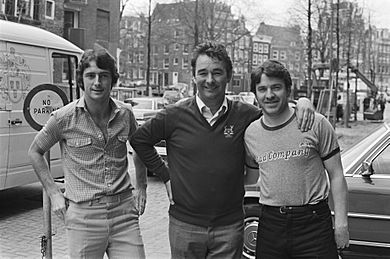
Forest won the 1979 European Super Cup in January 1980, beating F.C. Barcelona 2–1 overall. They reached a third League Cup final in 1980 but lost 1–0 to Wolves. In the 1979–80 European Cup quarter-final, Forest won against Dinamo Berlin. They then beat Ajax 2–1 overall in the semi-final. Forest defeated Hamburg 1–0 in the 1980 European Cup Final in Madrid to win the trophy again! Robertson scored the winning goal. Forest finished fifth in the league that season.
In the 1980–81 European Cup, Forest lost to CSKA Sofia. Forest also lost the 1980 European Super Cup to Valencia and the 1980 Intercontinental Cup to Club Nacional de Football in Tokyo.
After this, the successful team was broken up as players were sold. Clough and Taylor later said this was a mistake. The new team, with younger players, did not win more trophies.
In the 1983–84 UEFA Cup semi-finals, Forest lost to Anderlecht in a controversial match. Years later, it was found that the referee had received money from Anderlecht's chairman before the game. UEFA later banned Anderlecht from European competition for a year.
Forest won the Football League Centenary Tournament final in April 1988. They finished third in the league in 1988 and reached the FA Cup semi-finals. Stuart Pearce was chosen for the PFA Team of the Year five times in a row.
In January 1989, Clough was involved in an incident with some fans during a pitch invasion. He was fined and banned from the touchline. Forest beat QPR 5–2 in that game.
Forest won the 1989 Full Members Cup final, beating Everton 4–3. They then beat Luton Town 3–1 in the League Cup final. Nigel Clough scored two goals. Forest hoped to win three cups, but a week after the League Cup win, the Hillsborough disaster happened during their FA Cup semi-final against Liverpool. The match was stopped. When the game was replayed, Forest lost 3–1. Forest finished third in the league for the second year in a row. However, English clubs were still banned from European competitions after the Heysel Stadium Disaster, so they couldn't play in the UEFA Cup.
Nigel Jemson scored as Forest beat Oldham Athletic 1–0 to win the League Cup again in 1990. Clough reached his only FA Cup final in 1991. Pearce scored for Forest against Tottenham Hotspur at Wembley. But Spurs won 2–1 after extra time. English clubs were allowed back into Europe for the 1990–91 season, but Forest, as League Cup winners, were not included.
In summer 1991, Forest signed Teddy Sheringham for a club record fee of £2.1 million. In the 1991–92 season, Forest won the Full Members Cup Final. They lost to Manchester United in the 1992 Football League Cup Final. Forest had played in seven domestic cup finals in five seasons, winning five of them. Forest finished eighth in the league that season, earning a place in the new FA Premier League.
In summer 1992, Des Walker moved to Italy. On 16 August 1992, Forest beat Liverpool 1–0 at home in the first ever live televised Premier League game. Sheringham scored the only goal. But only a week later, Sheringham moved to Tottenham. Forest's performance declined, and Clough's 18-year time as manager ended in May 1993 when Forest were relegated from the Premier League. In the last game, Forest lost 2–1, with Clough's son, Nigel, scoring the last goal of the Brian Clough era at Nottingham Forest. After relegation, Roy Keane was sold for a record fee to Manchester United.
Other Job Links
Brian Clough was a popular choice to become England manager throughout the 1970s and 1980s. However, many felt that the FA (Football Association) didn't want to hire him because of his strong opinions about English football authorities. He was interviewed twice for the job, in 1977 and 1982, but Ron Greenwood and Bobby Robson were chosen instead. Clough himself joked that he would have wanted to "run the show" if he got the job. He is often called the "greatest manager England never had."
In 1988, Clough was offered the job as manager of Wales on a part-time basis. Clough was interested, but Nottingham Forest's directors wouldn't let him take on another role. He also had links to the Scotland and Republic of Ireland manager jobs.
Disagreement with Peter Taylor
Peter Taylor, Clough's close friend and long-time assistant, retired from football in 1982. This ended their partnership. Their friendship had faced challenges before. While at Derby, Taylor was upset when Clough accepted a pay rise without telling him. In 1980, Taylor released a book about their partnership without telling Clough. Six months after retiring, Taylor became manager of Derby County. When their teams played in the FA Cup in January 1983, the two managers ignored each other. Derby County won 2–0.
The final break in their friendship happened when Taylor signed John Robertson from Forest in May 1983 without telling Clough. Robertson said this was "the straw that broke the camel's back." The two men never spoke again. Clough publicly criticized Taylor, and Taylor responded by saying Clough's comments were what he expected from someone he now disliked.
Their disagreement was not fixed before Taylor died in October 1990. However, Clough and his family attended Taylor's funeral. Taylor's daughter said Clough was "deeply upset" by Taylor's death. Clough dedicated his 1994 autobiography to Taylor and paid tribute to him when he received the freedom of Nottingham.
Later Life and Legacy
After retiring, Clough focused on his health. He considered managing Wolverhampton Wanderers in 1995, but it didn't happen. His managerial career was over.
Nottingham Forest honored him by renaming their largest stand, the Executive Stand, the Brian Clough Stand. In 2002, Clough was one of the first people to be included in the English Football Hall of Fame for his great success as a manager. He was given the freedom of the city of Nottingham in 1993 and Derby in 2003.
Clough was a lifelong socialist. He supported trade unions and was chairman of the Anti-Nazi League. He was asked twice by the Labour Party to become a politician but chose to continue his football career. He joked that he was a "champagne socialist" because he shared his money, unlike some wealthy people.
On 4 April 1959, Clough married Barbara Glasgow. He said marrying Barbara was "the best thing I ever did." They had three children: Simon, Nigel, and Elizabeth. Nigel also became a professional footballer and played for his father at Forest. Later, Nigel became manager of Derby County, following in his father's footsteps. Barbara Clough passed away in 2013.
Clough died of stomach cancer on 20 September 2004, at age 69. Fans of both Derby County and Nottingham Forest, who are usually rivals, mourned his death together. A memorial service was held at Derby's Pride Park Stadium and was attended by over 14,000 people.
In August 2005, the road connecting Nottingham and Derby, the A52, was renamed Brian Clough Way. His wife, Barbara, was very grateful. A tram in Nottingham was also named Brian Clough.
In 2007, Clough's hometown of Middlesbrough unveiled a statue of him in Albert Park. In August 2008, a website was set up to honor Clough, with his family's support. This helped raise money for another statue of Clough in Nottingham's Old Market Square, which was unveiled on 6 November 2008.
Derby County and Nottingham Forest now play for the Brian Clough Trophy in their matches. Money from these games goes to charities. In 2010, a statue of both Brian Clough and Peter Taylor was unveiled at Derby's Pride Park Stadium.
The Damned United
The story of Clough's difficult 44 days as manager of Leeds United was made into a novel by David Peace called The Damned Utd (2006). It focuses on the rivalry between Clough and Don Revie. The book was popular but also caused some debate because it showed Clough in a negative way and had some historical mistakes. The Clough family was disappointed with the book.
The book was later made into a film called The Damned United in 2009, starring Michael Sheen. The Clough family chose not to help with the film, even though the filmmakers tried to make it less dark than the book.
Bloody Southerners
In 2018, a book called Bloody Southerners: Clough & Taylor's Brighton & Hove Albion Odyssey was written by Spencer Vignes. It tells the story of Clough and Taylor's time managing Brighton & Hove Albion. Clough only stayed for a few months before going to Leeds United. Taylor stayed on as manager until 1976.
Career Statistics
As a player
| Club | Season | League | FA Cup | League Cup | Total | |||||
|---|---|---|---|---|---|---|---|---|---|---|
| Division | Apps | Goals | Apps | Goals | Apps | Goals | Apps | Goals | ||
| Middlesbrough | 1955–56 | Second Division | 9 | 3 | 0 | 0 | — | 9 | 3 | |
| 1956–57 | Second Division | 41 | 38 | 3 | 2 | — | 44 | 40 | ||
| 1957–58 | Second Division | 40 | 40 | 2 | 2 | — | 42 | 42 | ||
| 1958–59 | Second Division | 42 | 43 | 1 | 0 | — | 43 | 43 | ||
| 1959–60 | Second Division | 41 | 39 | 1 | 1 | — | 42 | 40 | ||
| 1960–61 | Second Division | 40 | 34 | 1 | 0 | 1 | 2 | 42 | 36 | |
| Total | 213 | 197 | 8 | 5 | 1 | 2 | 222 | 204 | ||
| Sunderland | 1961–62 | Second Division | 34 | 29 | 4 | 0 | 5 | 5 | 43 | 34 |
| 1962–63 | Second Division | 24 | 24 | 0 | 0 | 4 | 4 | 28 | 28 | |
| 1963–64 | Second Division | 0 | 0 | 0 | 0 | 0 | 0 | 0 | 0 | |
| 1964–65 | First Division | 3 | 1 | 0 | 0 | 0 | 0 | 3 | 1 | |
| Total | 61 | 54 | 4 | 0 | 9 | 9 | 74 | 63 | ||
| Career total | 274 | 251 | 12 | 5 | 10 | 11 | 296 | 267 | ||
As a manager
| Team | From | To | Record | ||||
|---|---|---|---|---|---|---|---|
| P | W | D | L | Win % | |||
| Hartlepools United | 29 October 1965 | 5 June 1967 | 85 | 37 | 14 | 34 | 43.5 |
| Derby County | 5 June 1967 | 15 October 1973 | 332 | 161 | 78 | 93 | 48.5 |
| Brighton & Hove Albion | 1 November 1973 | 20 July 1974 | 34 | 12 | 9 | 13 | 35.3 |
| Leeds United | 30 July 1974 | 12 September 1974 | 8 | 1 | 4 | 3 | 12.5 |
| Nottingham Forest | 3 January 1975 | 8 May 1993 | 994 | 464 | 263 | 267 | 46.7 |
| Total | 1,453 | 675 | 368 | 410 | 46.5 | ||
Honours
Player
Middlesbrough
- North Riding Senior Cup: 1954–55
England
- British Home Championship: 1959–60
Individual
- Second Division top goalscorer: 1958–59, 1959–60
- Northern Echo Middlesbrough's Greatest XI (1876–2017)
Manager
Derby County
- First Division: 1971–72
- Second Division: 1968–69
- Texaco Cup: 1971–72
Nottingham Forest
- First Division: 1977–78
- League Cup: 1977–78, 1978–79, 1988–89, 1989–90
- Full Members Cup: 1988–89, 1991–92
- FA Charity Shield: 1978
- European Cup: 1978–79, 1979–80
- European Super Cup: 1979
- Anglo-Scottish Cup: 1976–77
Individual
- Manager of the Year: 1977–78
- European Coach of the Year—Sepp Herberger Award: 1979
- European Coach of the Season: 1979–80
- Order of the British Empire (OBE) for services to football: 14 June 1991
- LMA Hall of Fame inductee: 1989
- PFA Merit Award: 1992
- English Football Hall of Fame inductee: 2002
- Freedom of the City of Derby 3 May 2003.
- ESPN 3rd Greatest Manager of All-Time: 2013
- France Football 15th Greatest Manager of All-Time: 2019
- World Soccer 17th Greatest Manager of All-Time: 2013
- Made in Derby Walk of Fame: 2018
- NFFCNA Hall Of Fame inductee: 2019
See also
 In Spanish: Brian Clough para niños
In Spanish: Brian Clough para niños
- List of English football championship winning managers
- List of longest managerial reigns in association football
 | Delilah Pierce |
 | Gordon Parks |
 | Augusta Savage |
 | Charles Ethan Porter |


